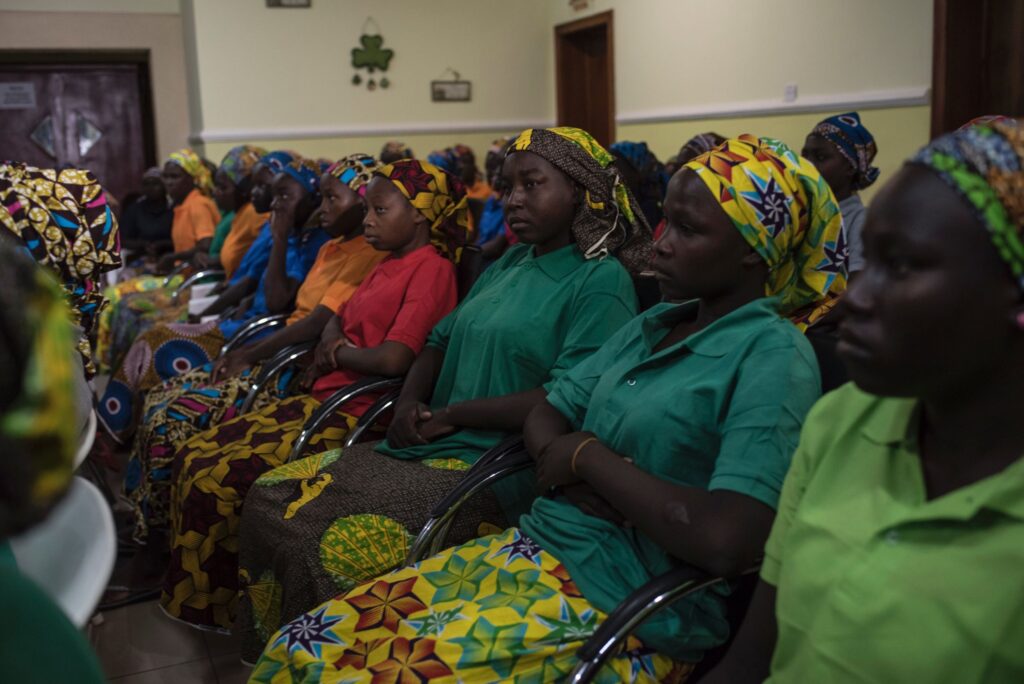
IMAGE CREDIT: STEFAN HEUNIS/AFP/GETTY
Binta’s life changed forever at the tender age of 12, shattered in one night by the terror of militants raiding her village in Borno State, Nigeria. She, along with her family, were forcefully taken into Sambisa Forest, where they endured nine months of fear and uncertainty. Tragically, Binta witnessed her father’s execution, a brutal act that would haunt her for years to come.
“I watched as they killed my father in front of me, despite my pleas and that of my mother. That day remains the saddest day of my life. There are nights when I wake up and the image plays out all over again.”
Binta
After a miraculous escape alongside her mother and siblings, Binta’s journey to recovery began. Little did she know that her path would intersect with the devastating events that unfolded in Chibok, just a year after her own abduction. In April 2014, 276 girls were kidnapped from their school by Boko Haram, an act that would reverberate around the world, sparking the #BringBackOurGirls campaign.
Today, 187 of the abducted Chibok Girls have either been rescued or escaped and reunited with their families, but many remain missing, a stark reminder of the ongoing trauma faced by their loved ones. Of that number, Between 2016 and 2023, no fewer than 21 Chibok girls who escaped captivity or were rescued by the military, returned with 34 children, according to a recent report by the Murtala Muhammed Foundation. Binta’s story, like theirs, is one of resilience and hope, a testament to the human spirit’s capacity to endure and overcome unimaginable adversity.
Binta’s journey to healing was supported by Neem Foundation, an organisation dedicated to providing mental health and psychosocial support to victims of violence. Through Neem’s Lafiya Sarari program, Binta found solace and a path back to education, a vital step in rebuilding her shattered life.
The power of mental health support and education in the lives of survivors like Binta cannot be overstated. It is not just about acquiring knowledge; it is about reclaiming agency and rebuilding fractured lives. For many survivors, returning to education represents a defiant act of reclaiming the future that was once stolen from them.
“It’s a lot easier sleeping now, the panic attacks are less, I no longer live with as much fear as I did before I became a student at Lafiya Sarari as the in-house Psychologist is always there to listen to me and others like myself.”
Binta
While there are several survivors of violent abductions who have, just like Binta, gotten a second chance at life with mental health and educational support, there are still many who aren’t as opportuned.
As we reflect on the 10th anniversary of the Chibok girls abductions, Binta’s story serves as a poignant reminder of the tragedies that continue to unfold in Nigeria and beyond. The threat of kidnappings persists, with over 1,680 students abducted since 2014 according to Save The Children.
Besides the abductions, more than 180 school children lost their lives, and nearly 90 others sustained injuries in 70 separate attacks spanning from April 2014 to December 2022. During this period, an estimated 60 school staff members were abducted, and 14 lost their lives. Additionally, 25 school buildings were reportedly destroyed. The attacks were predominantly concentrated in North-West Nigeria, accounting for 49 incidents, followed by North-Central Nigeria with 11 attacks.
Due to the insecurity situation in Northern Nigeria and frequent attacks on schools and students in the region, there’s been sporadic increase in out of school children in the country and specifically in the region. In early 2023, UNICEF estimated the total number of out of school children to be 20.2 million, doubling the 10.5 million previously quoted for years. Millions of youngsters in the region are now losing out on their fundamental right to education as a result of this challenge.
As we mark this grim anniversary of the abduction of the Chibok girls, necessity is laid on us to remember those still living in the shadow of abduction and violence. It is our collective responsibility to advocate for more than just recovery; let us strive for transformation and healing. It is through sustained support and education that survivors like Binta can truly begin to rebuild their lives and communities.
